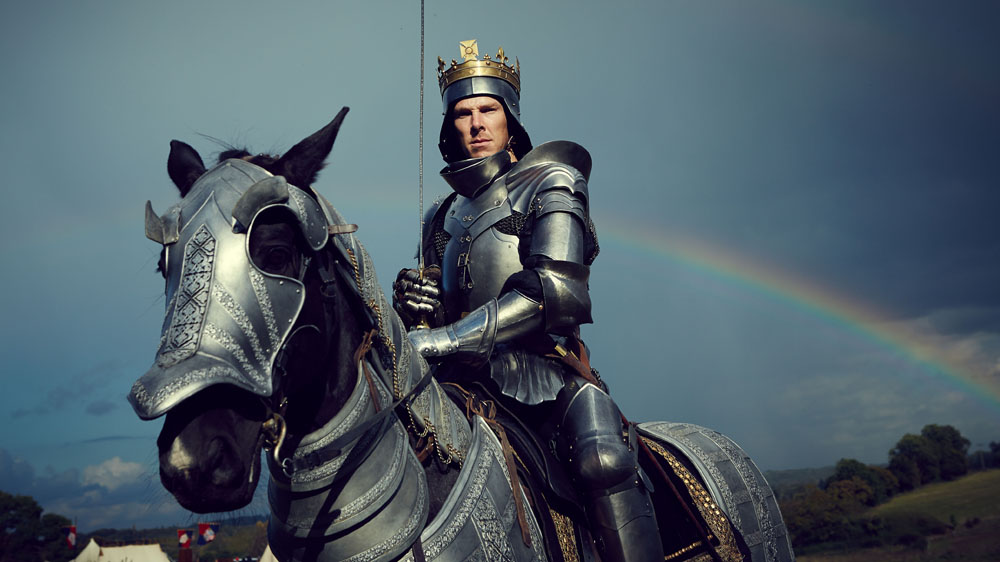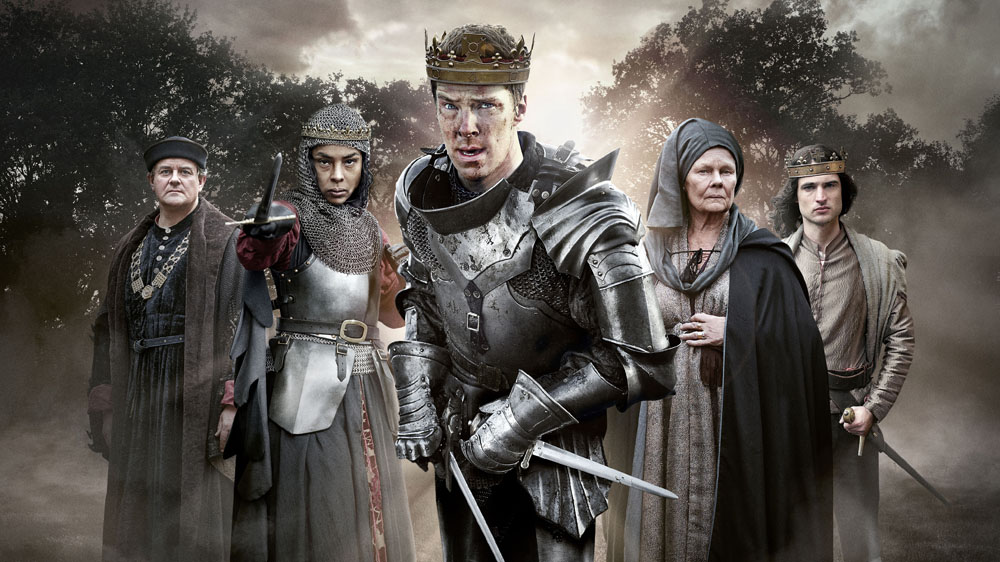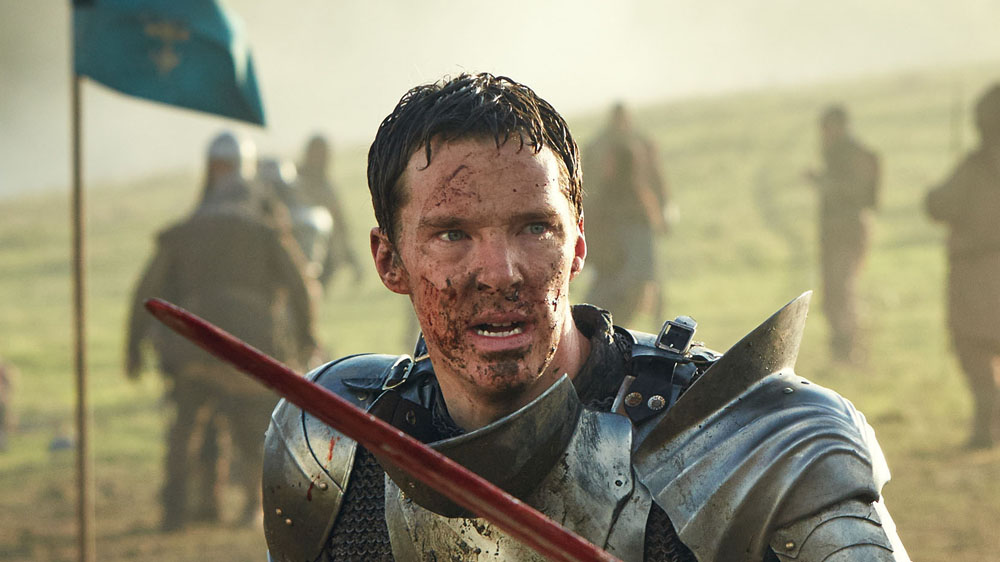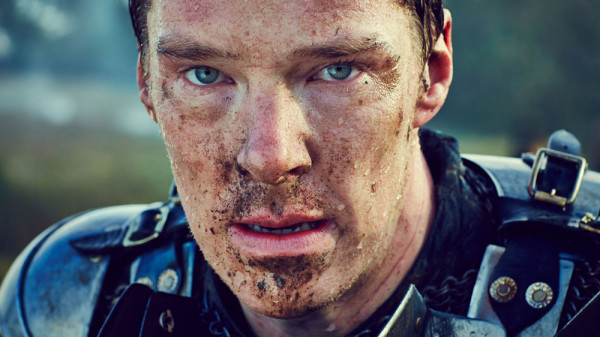Sherlock star Benedict Cumberbatch plays Richard in The Hollow Crown: The Wars Of The Roses.
Following the success of the BAFTA Award-winning first The Hollow Crown season in 2012, BBC Two brings the concluding part of this ambitious cycle of Shakespeare’s History plays to the screen with adaptations of Henry VI (in 2 parts) and Richard III.
The cast also includes Judi Dench, Sophie Okonedo, Hugh Bonneville, Sally Hawkins, Keeley Hawes, Tom Sturridge, Michael Gambon, Philip Glenister and Cumberbatch’s Sherlock co-star Andrew Scott.
> Buy the first season on DVD on Amazon.
> Order The Wars of the Roses on DVD on Amazon.
Here Benedict Cumberbatch chats about his role…
How did you connect with the character?
“In terms of tackling the real historical figure versus the fictionalised version in Shakespeare, I think we’re smart enough as audiences that the two can coexist.
“The script does all the heavy lifting. Richard tells the audience about how wrong he feels in his body, about being dejected and overlooked, and about being unable to be part of a royal courtly life with the Plantagenets.
“In medieval England if you were not born perfect you were often drowned at birth. It was a terrible social taboo. In Shakespeare’s story, Richard is fostered at a distance from the Kennedy-like family of perfect specimens. There’s very little care for him. His deep-seated anger and hurt leads to his ambition and everything we know of him. That was our way into humanising him.”
Do you see Richard III as a villain or as an antihero?
“His arc is hugely brilliant. In Richard III he gives a speech about how he’s going to go and kill the king, Henry, and how this ties into his feelings about himself as a disabled man. I think that humanises him. As an actor you have to flesh out your character. You can’t pantomime with the daggers and the looks, because that gets really dull.

“There’s such humour in other moments where Richard relishes his plans. He’s an antihero because he lures us in. He’s very funny, hopefully. Audiences don’t necessarily side with him but they revel in his villainy! I also don’t want to burden Freudian analysis onto him and make him more understandable.
“I don’t want to say, ‘Oh, he’s just a victim of this cruel world. Oh, what other choice did he have?’ Of course he had choices. He very clearly makes the wrong ones and suffers the ultimate downfall for that.”
What do you think of Ben Power’s scripts?
“Richard III is often performed stand-alone, because you can mention it in the same breath as Macbeth and Othello, if not, say, Hamlet. It is a standalone of the histories in a way that the Henry VI’s aren’t. What Ben has done is to create a sense of a through-line in the themes across the plays. He has created a real sense of urgency.”
What’s it like to work with such a stellar cast and crew?
“It’s exciting to see the talent you can draw due to the shorter engagement period. For example, it took Judi Dench a matter of days to film her scenes playing my mother, but to get someone of that ilk to do that on stage would be tricky, if not well nigh impossible.

“History cycles are sometimes done, but rarely with the same director, and in this medium I can’t think of these plays ever having been done with the same director back to back like this. This series of The Hollow Crown is a continual drama rather than three separate films.
“Dominic Cooke is an extraordinary director and someone who managed the Royal Court, one of our best-loved theatres, through a period of one of the best incarnations of new writing. He is so beloved in our industry, as well as being utterly brilliant, very kind and generous. You feel in safe hands.
“It’s a winning element that we have the combination of Ben Power, the script-writer, along with Karen Hartley Thomas who worked on the prosthetics, with Dominic overseeing all.”
What was it like working on location when shooting these scenes?
“One of the joys of the job was an extraordinary heritage tour of Great Britain. It was a real honour for all of us to have access to these incredible parts of our history.
“It was awe-inspiring to be on these hallowed bits of preserved or ruined ground which these characters might actually have walked upon. The settings immediately create a sense of drama and scope.”
What was like to recreate the medieval battles?
“We were carrying around weapons of steel and aluminium, which were props but could still do a great deal of damage. We were fighting in fields and in rivers with water literally up to our chests. It was brutal.

“The broadsword as a weapon could crack your skull open with just a glancing blow. It really is such a barbarous way to go about winning power. I’m in awe of it. The training was tough – all of us would come away from training looking shell-shocked and pale!”
How do you reconcile the play with the historical Richard III, whose remains were recently discovered?
“Physicality has always been at the centre of playing Richard III. He is very clearly described as being a hunchback with disproportionate legs. His physicality is there in the play and the script, in his own analysis and in other people’s name-calling. It is unavoidable.
“On camera, anatomical accuracy is even more important because of the scrutiny provided by the lens. In the opening shots of Richard III we have the character topless, so you can see every detail of the curvature of his spine. It took me about 3-4 hours to put on the prosthetics.
“The weight of the silicone is incredible. It’s painted to match the skin tone and it looks distressingly real. By contrast, on stage Richard’s body has always been something to hide.”
> Buy the first season on DVD on Amazon.
> Order The Wars of the Roses on DVD on Amazon.
Watch the trailer…
Are you looking forward to the return of The Hollow Crown? Let us know below…

